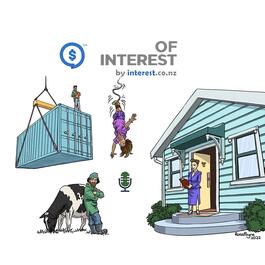
Andrew Coleman: Swapping NZ's gas guzzling Holden government retirement income system for an EV
The Government could run a second retirement income scheme alongside NZ Superannuation as part of a transition to a new system, but according to Andrew Coleman, this couldn't be done without an increase in taxes on older people, or more general tax increases. Fresh from his 13 part interest.co.nz series on NZ's government retirement income system and associated taxes, Coleman spoke to myself and Terry Baucher on a combined episode of the Of Interest podcast and the New Zealand Tax Podcast. Coleman is currently a visiting professor at the Asia School of Business in Kuala Lumpur while on extended leave from the Reserve Bank. He has also worked for Treasury and the Productivity Commission. The views expressed are his own. Coleman says the urgency for making change isn't just down to an ageing population and the increasing taxes he says young people will have to pay. It's also because those under 45 are inheriting a very costly system, which might not be what they like or want. He uses an analogy of a 22 year-old who recruits help from their father or uncle to buy a car. "And he says, 'oh, cars, I'm good at cars. You know, when I was a kid we had these great Holdens and you could put six people in them, everyone in the whole family would fit in them. And they had a big six litre engine'... And you say, 'oh, well that's maybe not what I wanted.' But he says 'oh look, I'll go and get you the car, just give me the money and I'll get you the car.' And so you give him ten grand and [he] comes back [with an] old Holden, which is a gas guzzler and not particularly safe." "And you've only got a girlfriend or a boyfriend and no kids and it's nothing like the car that you want and yet you've paid for it. And it's got these high ongoing costs because it's chewing down the petrol," Coleman says. "You wanted a little hybrid or electric car or maybe just a Toyota Corolla, which was quite small and fits in your little parking place. And it's a bit like that. Young people today are inheriting a [retirement income] system designed in the seventies when Holdens ruled. And it may not be what they want and it's very costly." In his series Coleman suggests a new pension system, which he calls KiwiSaver 2.1, which would be a shift from pay-as-you-go funded pensions to save-as-you-go funded pensions. I asked him whether a transition could be made to the new system for those under 45, with the current system kept in place for older people, without higher taxes on older people which he suggested in his series would be required to change to a new system. "There's no reason why you can't have two systems going. And one of the reasons is that your entitlement would depend on your birth date...that's very straightforward. We would just at some point introduce the second system for people under 45 and build it up and keep old people on the current system," says Coleman. "Can we do it without an increase in taxes on older people, or more generally? No." "There is a transition issue. It's like digging a hole. Once you've dug the hole, if you want to get out of the hole, you have to do some work to fill it in again. And so when we adopted a pay as you go system or expanded it significantly back in the 1970s, it meant that to reverse it, some future generations are going to have to be worse off than they otherwise would have been. And that's the political difficulty here. It's like there's this beautiful thing that you want over there, a beautiful island that you can go to, but you can't get there for free." "But there's goodwill out there. I think a lot of people my age... recognise that young people are paying a disproportionate amount of the costs and that if we can find a way of increasing taxes on ourselves in order to make the system better for younger people, that's something that a lot of people would be prepared to do now. It won't have to be a permanent increase in taxes. It's a transitory phenomenon," Coleman says. "Once we've got the new system up and running, taxes would come down and we would have a much better tax system. There should be, if we do this, a statue to the unknown 75 year-old who paid a few more taxes so that all the young New Zealanders of the future could be better off and have a better system." In terms of what tax(es) are used, Coleman says a transitional social security tax on older people is an option. Social security taxes, such as Accident Compensation Corporation levies, are paid on labour income. There's much more detailed discussion in the podcast audio including on taxes. *You can find all episodes of the Of Interest podcast here.
From "Of Interest"


Comments
Add comment Feedback